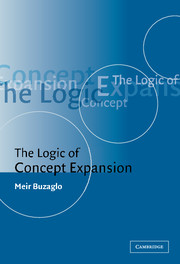Book contents
- Frontmatter
- Contents
- Preface
- Acknowledgments
- Introduction
- 1 Historical background
- 2 Frege's opposition
- 3 The grammar of constraints
- 4 Expansions as rational procedures
- 5 Implications for concepts
- 6 From words to objects
- 7 Gödel's argument
- 8 Implications for thoughts
- 9 “I was led astray by language”
- Epilogue: How do we go on from here?
- References
- Index
7 - Gödel's argument
Published online by Cambridge University Press: 22 September 2009
- Frontmatter
- Contents
- Preface
- Acknowledgments
- Introduction
- 1 Historical background
- 2 Frege's opposition
- 3 The grammar of constraints
- 4 Expansions as rational procedures
- 5 Implications for concepts
- 6 From words to objects
- 7 Gödel's argument
- 8 Implications for thoughts
- 9 “I was led astray by language”
- Epilogue: How do we go on from here?
- References
- Index
Summary
The concept of forced expansion has been sufficiently articulated by now so as to facilitate finding such expansions in other settings. In the present chapter I will examine one of Gödel's arguments, which has not yet been given the attention it deserves, but which is easy to disclose once we are aware of non-arbitrary developments of concepts (I shall call it “Gödel's second argument”).If we reformulate this argument in the terminology that has been developed here, we can understand Gödel as claiming that the very existence of forced expansions proves (a) the existence of concepts and at the same time (b) naturally leads to the possibility of perceiving them. In the first part of the present chapter I set forth Gödel's argument in broad outline.
In the second part I examine the notion of the perception of concepts as it arises from Gödel's descriptions. Here I try to show how this argument is relevant to the lively discussion about this notion of Gödel's, which has developed around Gödel's more famous argument deriving our intuition of objects from the fact that the axioms of set theory are forced on us (call this “Gödel's first argument”).Familiarity with the phenomenon of expansions allows us to refine Gödel's picture and make his views seem more plausible.
In the third part of the chapter I discuss Gödel's argument in favor of realism for concepts.
- Type
- Chapter
- Information
- The Logic of Concept Expansion , pp. 116 - 133Publisher: Cambridge University PressPrint publication year: 2001



